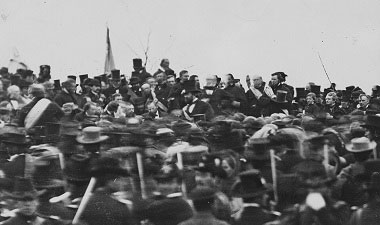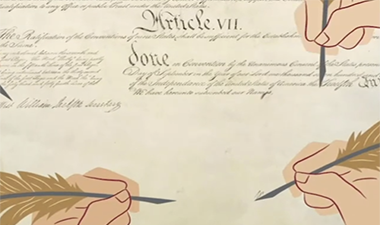In this 1776 sermon, Haynes offers an abolitionist argument that reveals the incompatibility of American independence—a push rooted in key principles like liberty, equality, the pursuit of happiness, and the consent of the governed—with the institution of slavery.
Explanation
Lemuel Haynes is widely considered to be the first Black ordained minister in the United States. He also served briefly in the Continental Army during the American Revolution. Haynes was greatly influenced by the teachings of key figures of the Great Awakening like Jonathan Edwards and George Whitefield. In this 1776 sermon, Haynes offers an abolitionist argument that reveals the incompatibility of American independence—a push rooted in key principles like liberty, equality, the pursuit of happiness, and the consent of the governed—with the institution of slavery. To advance this critique, Haynes employs the language of the Declaration of Independence, the Bible, and republicanism—arguing that African Americans possess the same natural rights as white Americans and that the practice of slavery is fundamentally inconsistent with Christianity, the American idea, and the principles of republican government. Haynes’s sermon is a powerful reminder that abolitionist voices have been a key part of the American story since the beginning of the nation and that those fighting against slavery often rooted their arguments in the text and principles of the Declaration of Independence.
Excerpt
As tyrony had its Origin from the infernal regions: so it is the Deuty, and honner of Every son of freedom to repel her first motions. But while we are Engaged in the important struggle, it cannot Be tho’t impertinent for us to turn one Eye into our own Breast, for a little moment, and See, whether thro’ some inadvertency, or a self-contracted Spirit, we Do not find the monster Lurking in our own Bosom; that now while we are inspir’d with so noble a Spirit and Becoming Zeal, we may Be Disposed to tear her from us. If the following would produce such an Effect the auther should rejoice.
. . .
Liberty, & freedom, is an innate principle, which is unmovebly placed in the human Species; and to see a man aspire after it, is not Enigmatical, seeing he acts no ways incompatible with his own Nature; consequently, he that would infring upon a mans Liberty may reasonably Expect to meet with oposision, seeing the Defendant cannot Comply to Non-resistance unless he Counter-acts the very Laws of nature.
. . .
One man may bost a superorety above another in point of Natural previledg; yet if he can produse no convincive arguments in vindication of this preheminence his hypothesis is to Be Suspected. To affirm, that an Englishman has a right to his Liberty, is a truth which has Been so clearly Evinced, Especially of Late, that to spend time in illustrating this, would be But Superfluous tautology. But I query, whether Liberty is so contracted a principle as to be Confin’d to any nation under Heaven; nay, I think it not hyperbolical to affirm, that Even an affrican, has Equally as good a right to his Liberty in common with Englishmen.
I know that those that are concerned in the Slave-trade, Do pretend to Bring arguments in vindication of their practise; yet if we give them a candid Examination, we shall find them (Even those of the most cogent kind) to be Essencially Deficient. We live in a day wherein Liberty & freedom is the subject of many millions Concern; and the important Struggle hath already caused great Effusion of Blood; men seem to manifest the most sanguine resolution not to Let their natural rights go without their Lives go with them; a resolution, one would think Every one that has the Least Love to his country, or future posterity, would fully confide in, yet while we are so zelous to maintain, and foster our own invaded rights, it cannot be tho’t impertinent for us Candidly to reflect on our own conduct, and I doubt not But that we shall find that subsisting in the midst of us, that may with propriety be styled Opression, nay, much greater opression, than that which Englishmen seem so much to spurn at. I mean an oppression which they, themselves, impose upon others.
. . .
And the main proposition, which I intend for some Breif illustration is this, Namely, That an African, or, in other terms, that a Negro may Justly Chalenge, and has an undeniable right to his Liberty: Consequently, the practise of Slave-keeping, which so much abounds in this Land is illicit. .
. . .
It hath pleased god to make of one Blood all nations of men, for to dwell upon the face of the Earth. . . . And as all are of one Species, so there are the same Laws, and aspiring principles placed in all nations; and the Effect that these Laws will produce, are Similar to Each other. Consequently we may suppose, that what is precious to one man, is precious to another, and what is irksom, or intolarable to one man, is so to another, consider’d in a Law of Nature. Therefore we may reasonably Conclude, that Liberty is Equally as pre[c]ious to a Black man, as it is to a white one, and Bondage Equally as intollarable to the one as it is to the other: Seeing it Effects the Laws of nature Equally as much in the one as it Does in the other. But, as I observed Before, those privileges that are granted to us By the Divine Being, no one has the Least right to take them from us without our consen[t]; and there is Not the Least precept, or practise, in the Sacred Scriptures, that constitutes a Black man a Slave, any more than a white one.
. . .
Therefore is it not hygh time to undo these heavy Burdens, and Let the Oppressed go free? And while you manifest such a noble and magnanimous Spirit, to maintain inviobly your own Natural rights, and militate so much against Despotism, as it hath respect unto yourselves, you do not assume the Same usurpations, and are no Less tyrannic. Pray let there be a congruity amidst you Conduct, Least you fall amongst that Class the inspir’d pen-man Speaks of. Rom. 2.21 and on. thou therefore which teacheth another, teachest thou not thy Self? thou that preachest a man Should not Steal, Dost thou Steal? thou that sayest, a man Should not Commit adultery, Dost thou Commit adultery? thou that abhorreth idols, Dost thou Commit Sacrilege? thou that makest thy Boast of the Law, through Breaking the Law Dishonorest thou God? While you thus Sway your tyrant Scepter over others, you have nothing to Expect But to Share in the Bitter pill. ’Twas an Exelent note that I Lately read in a modern peice, and it was this. “O when shall America be consistently Engaged in the Cause of Liberty!” If you have any Love to yourselves, or any Love to this Land, if you have any Love to your fellow-men, Break these intollerable yoakes, and Let their names Be remembered no more, Least they Be retorted on your own necks, and you Sink under them: for god will not hold you guiltless.
Sirs, the important Caus in which you are Engag’d in is of a[n] Exelent nature, ’tis ornamental to your Characters, and will, undoubtedly, immortalize your names thro’ the Latest posterity. And it is pleasing to Behold that patriottick Zeal which fires your Breast; But it is Strange that you Should want the Least Stimulation to further Expressions of so noble a Spirit. Some gentlemen have Determined to Contend in a Consistant manner: they have Let the oppressed go free; and I cannot think it is for the want of such a generous princaple in you, But thro’ some inadvertency that . . .







